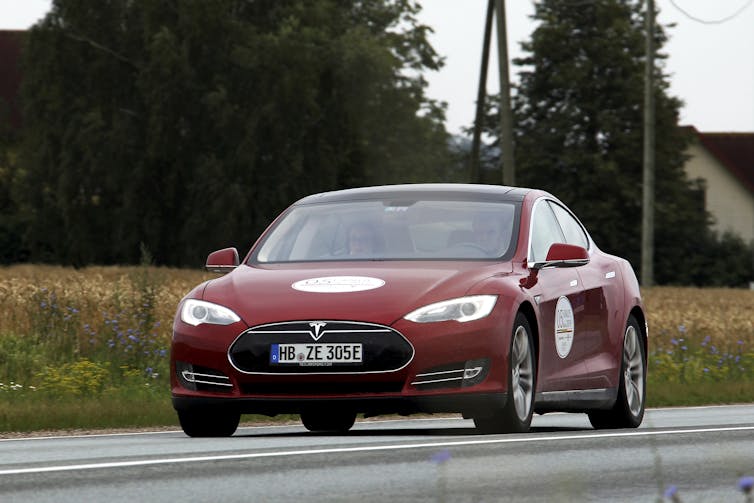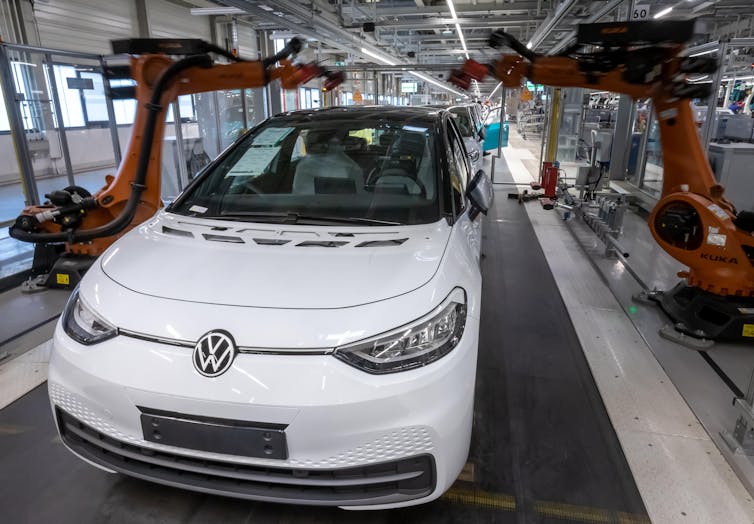Volkswagen’s CEO Herbert Diess announced that he wants to recruit an “aggressive climate activist” to work for the company, with direct access to the board in order to challenge its green policies. While this seems honourable, VW is starting from a bad position. The company belongs to an industry that is responsible for 72% of transport emissions in the EU – with transport itself being 30% of all CO₂ emissions.
In 2015, VW admitted to cheating emissions testing regimes. Its diesel engines were fitted with devices to make them look less polluting than they really were during testing by US and EU regulatory authorities. “Dieselgate” had huge knock-on effects, with buyers shunning diesel engine vehicles from all manufacturers in the past five years, and diesel sales down 27% in the UK year-on-year.
As if this wasn’t bad enough, evidence surfaced suggesting that as late as 2014, VW was testing its vehicle exhaust emissions on humans and monkeys in the US, when it had been known the exhausts contained particles that could cause cancer. In a post-Greta Thunberg world, VW is realising that it needs to clean up its act. In fact, it sounds like it wants its very own Thunberg.
The upstarts leading the market
The problem for VW is that in the past decade, the car industry has moved on – helped in no small part by a Californian company whose slogan is to accelerate the world’s transition to sustainable energy. That company is Tesla, and in 2019 it delivered nearly 400,000 fully electric cars that do not produce harmful tailpipe emissions and generally, over their life cycle, produce half the CO₂ of diesel cars.
The VW group delivered 80,000 plug-in cars over the same period, with a little over half being fully electric – one-tenth of Tesla’s production. This might look like progress for the German multinational, which is also the world’s largest automotive manufacturer. But when you consider VW made nearly 11 million vehicles in 2019, 40,000 is a drop in the ocean.
It’s not like electric vehicles are new to the German company. VW delivered its first widely available full electric model, the e-Up!, in 2013, which was the same year Tesla delivered its first Model S cars. The difference for consumers was that the e-Up! had a range of 93 miles, and the Model S 265 miles. Tesla’s 2020 Model S is now approaching 400 miles range on one charge. For many drivers choosing an electric car, the VW product has failed to keep up.

EPA-EFE/Toms Kalnins
So is VW trying to show that sustainable vehicles are now its primary objective? Or is it simply a PR stunt? Large corporations are only too aware that “edgy” branding strategies appeal to customers, and sustainability is very much in the public consciousness. Nike’s advertising campaign with Colin Kaepernick was just the latest, and of course, Apple perfected the use of “radical” imagery to sell stuff decades ago.
Certainly, VW has a long way to go – and if you take a look at the website, electric cars compose a large part of the company’s brand identity. But the problem for VW remains – an upstart electric vehicle company can sell ten times the number of cars it can, at a significantly higher average selling price.

EPA-EFE/UWE MEINHOLD
International motor shows in the past five years have been dominated by the move to electrification. Most manufacturers now agree that, at least for passenger cars, the future of their products is in electric vehicles. While many have flirted with hybrid and hydrogen power, lithium-ion batteries and electric motors have now proved that they can power not only the fastest, but also the cleanest vehicles, with the least disruption to existing infrastructure in developed areas. After all, electricity is already available in virtually all homes and businesses and where people park cars.
An enormous multinational such as VW does of course face unique challenges. Huge supply chains that have been carefully constructed, combined with numerous products that take years to develop – it all means that change is harder for VW than disruptive start-ups such as Tesla or Rivian.
What will change VW is what changes all businesses – demand from the market. The former CEO of General Motors, Bob Lutz, wrote the book Car Guys vs. Bean Counters when his company was the largest in the world. If electric vehicles is where the profitable business is, then that’s where all VW’s efforts will go.
Read more:
Nike, Colin Kaepernick and the pitfalls of ‘woke’ corporate branding
Just as people were convinced to buy diesel cars due to favourable tax regimes and lower running costs – even though the cars were more expensive and complex to manufacture – VW made huge amounts of them, because the market demanded it. While it’s often difficult for large companies such as VW to change, market forces will eventually lead them to do so anyway. The same goes for Shell renaming itself “She’ll” on International Women’s Day. Socially conscious branding is often a convenient vehicle for disguising cold, market logic.
Having your own boardroom Greta Thunberg simply makes for a better story.














